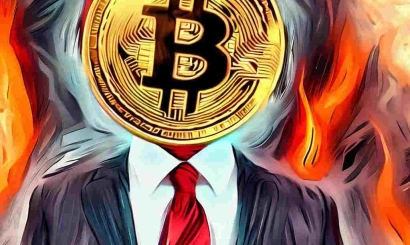"Your Own Bank. When cryptocurrencies will be available to everyone
Interviewed experts told about the conditions of mass acceptance of cryptocurrencies
Experts talked about the existing challenges of using cryptocurrencies and how to attract a new audience to the crypto market
Speaking at a conference in Hong Kong last week, Changpeng Zhao, head of major cryptocurrency exchange Binance, spoke about the growing interest in blockchain-based payments. In his opinion, their spread is strongly constrained by the current form of cryptocurrencies - they are too inconvenient for users and lack the security mechanisms needed to keep their data and finances safe.
This is the reason why most of those who use crypto assets in any form still prefer crypto exchanges and storage services with a centralized form of management similar to traditional financial services. According to Zhao, in part by sacrificing a degree of control over funds, users get an exchange to guarantee their security and a user-friendly interface. In addition, exchanges can act as a "bridge between CeFi and DeFi"
Asked what else would be needed for mass social acceptance of cryptocurrencies, Zhao called the main idea to provide an environment for users "so they can at least try it," adding that "reforming the traditional market will already be the next driving force."
"In a few clicks."
Much of blockchain projects are still difficult for most people because of the lack of user-friendly interfaces, the need to understand the nuances of working with these technologies, and the still high barriers to entry for new users. Web3 products reach mostly enthusiasts who are willing to understand the technical issues, and a completely unprepared audience often encounters insufficient onboarding.
"Our experience is that social media users are used to having new features available to them in a few clicks. They're not ready to move to other apps, for example, to create a cryptocurrency wallet. People need to be told affordably about the added value that crypto technology offers them."
Part of the mass adoption does come from the development of so-called custodial services, which act as intermediaries for people to access cryptocurrencies, comments a senior Bestchange analyst. In a sense, they are similar to banks, fulfilling the same function and making it easier to enter the market. By the way, their design usually repeats similar services of the traditional financial market, which also helps newcomers to understand.
The main problem is that cryptocurrencies offer a completely different concept of data and money management, unfamiliar to the mass consumer. "To oversimplify, in the traditional financial system, the consumer trusts the banks to hold and manage money on his or her behalf, but in the world of cryptocurrencies, each participant is his or her own bank."
Almost any move toward what is "convenient and secure" implies removing responsibility and handing over control to a third party, as in the traditional financial system. The question "What is mass adoption" in cryptocurrency is "rather philosophical," but the freedom to make one's own decisions and the range of possibilities that blockchain technology provides, in her opinion, can well be used en masse.
There are already projects that offer all kinds of interaction, both for fans of freedom and technology and for fans of "simplicity with the transfer of control. For the latter, the best ways are to allow cryptocurrency to be used in some simple domestic cases. "Here, for example, NFT technology helps a lot, and convenient wallets with built-in "foolproof" options or the introduction of regulation to protect against the actions of fraudsters are also suitable.
It is the introduction of NFT in social networks that can be the entry point to Web3 technologies for the mass user, referring to the current fragmentation of crypto services and their lack of social mechanics. If a user can create a wallet, buy a token, or put it up for sale, and run the necessary ads right in their social network account, they won't need to go to other resources, and the interface will be intuitive.
"Motivation issue."
If you look at the problem conceptually, the problem is not the complexity of the interfaces: once the concepts of "online banking" and "online payment" were new, but now it is the absolute norm. "Age is also not an obstacle, for example, on our site, a significant part of the audience is active adults, not from million-strong cities, - the analyst gives an example. - This is a question of motivation.
No matter how complicated the interface is, if a person needs to use a service, he will do his best to learn, or he will ask someone else to do it for him. Conversely, no matter how simple the interface is, no one will figure it out if there is no need for the service. For the mass consumer, it is still "some kind of a gimmick for losers", on which someone earns and someone loses.
Ordinary users, far from being enthusiastic about technology and striving for responsibility for their own funds, are really more interested in speculation. That said, developers of blockchain projects are still better off trying to strike a reasonable balance between simplifying with security and preserving the original principles, even if it will lead to more mistakes from users.
"In my opinion, the right solution is to have products on the market with different types of approaches to security and decentralization - This will reach a large number of users, leaves them with choices, and leads to adoption at different levels as a result."
Cryptocurrencies should be educated, infrastructure should be expanded, and their exchange rate stability should be increased. At some point there will be a qualitative transition from "an outlandish tool for speculators" to a convenient means of payment, the analyst believes. At the same time, in his opinion, the initial audience may leave the market because of the reduction of investment attractiveness after prices stabilize.
- Investment idea: Betting on the growth of tokens of Layer 2 projects
- Binance's share of the crypto market decreased by 16% in the first quarter of 2023
- How the field of stacking will change after the Ethereum update. Experts' opinions
- Ethereum's rise in price has brought a newcomer to the top 10 cryptocurrencies
- BofA calls the tokenization of traditional assets key to digital adoption
- Binance has withdrawn from circulation BNB tokens by almost $620 million
- Blockchain project Chia applied to the SEC for an IPO






